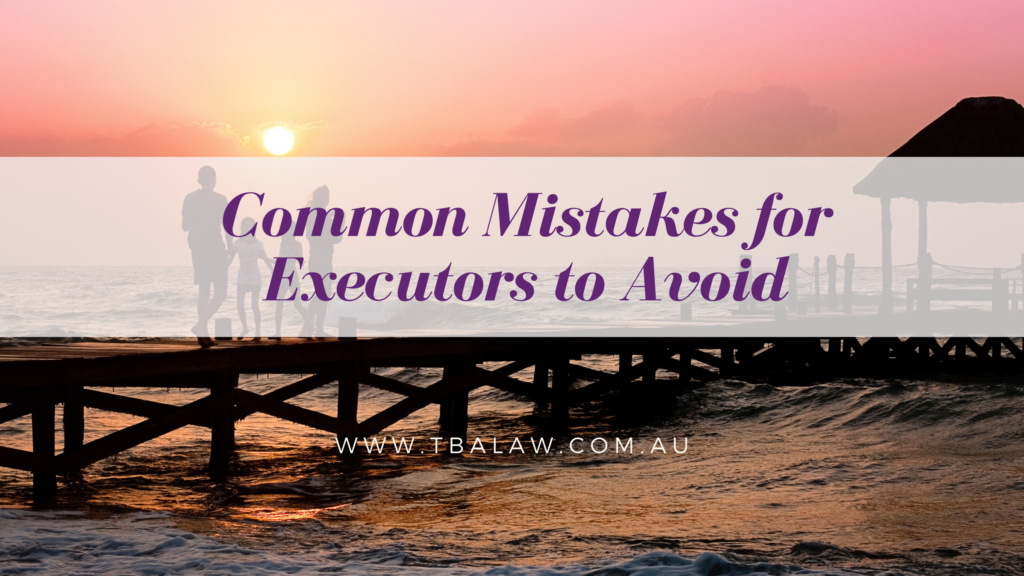Common mistakes for executors to avoid
Taking on the role
An executor can refuse the role. If you’re asked at the time the Will is made, it doesn’t mean you cannot change your mind later. Being an executors can be a difficult, and lengthy process.
If you have too many other things going on in your life, or the family dynamic is just too difficult, then don’t feel pressured to have to act as executor. But you must decide before the probate application.

You may reserve leave, to allow your co-executors to act without you. This means that you can act later, if there becomes an issue and you are required.
Or you can renounce the role altogether. This means that you tell the Supreme Court (via an affidavit) that you haven’t started taking on the role of executor and you never intend to.
Finally, if you do take on the role as executor, utilise your ability to delegate certain tasks to a solicitor, accountant, and other suitable professionals. Don’t think you need to do everything personally.
Not securing the assets
Another mistake for executors can be not securing the assets. Sometimes the biggest arguments between beneficiaries is over household contents. You should never assume that the family will cooperate.
As well as gathering in and securing large assets – like making sure real estate is insured, closing and collecting in bank accounts, selling share – you need to also secure the household contents and any cash that might be in the house.
Best to change the locks, if there’s any doubt, and then random family members cannot just attend the house without your knowledge and take bits and pieces.
If you don’t secure the cash in the house, the jewellery, and other personal items, then they often go missing. One beneficiary or someone with access to the house will just take what they want. It’s technically theft, but it’s unlikely that the police will want to hear about it. If anything value is taken, you may be liable for paying this amount into the estate to compensate the beneficiaries.
Not being thorough
Make sure you read and understand the Will – not doing this is a mistake for executors. This is your main responsibility – to ensure the Will is followed.
Your lawyer can help you to interpret the Will, but don’t expect your lawyer to remember everything about the Will that you’re administering. Your lawyer is likely to have 100 other files, so cannot remember all the details, particularly if it’s 6 months since they first met you when they’re preparing to help you distribute the estate. You may have to remind your lawyer of certain bequests and aspects of the Will further into the administration.
You are the executor, not your lawyer, and it’s you who will be liable if there’s a mistake.
Being held to ransom by the beneficiaries
Unfortunately some old Wills don’t make this clear, but all my Wills specifically say that the executor has sole discretion to determine the value of assets and to administer the estate in accordance with the Will.
As an executor, you are accountable to the Court. Not to the beneficiaries. You have to provide beneficiaries with certain information, if they request it, but you do not need the consent of beneficiaries to proceed with administering the estate in accordance with the Will.
If you are making changes to the gifts under the Will, then you need all the beneficiaries to consent. But otherwise, if you are acting in accordance with the Will and the law, then beneficiaries cannot object.
If a beneficiary really has a problem with how you’re administering the estate, then need to apply to the Supreme Court to ask the Court to get you to account to them. Then you answer to the Court, not the beneficiaries.
Becoming personally liable for debts or taxes
If there are debts of the estate, or taxes owed, then these must be paid before the final distribution of the estate. It is a serious mistake for executors to become liable personally.
If you don’t pay the debts and taxes, and the estate is distributed, then you can be liable to pay. You can try to claw money back from beneficiaries, but more than likely you’ll end up paying out of your own pocket in this case.
If you’re not aware of all the debts, you can publish an advertisement (with the help of your lawyer) for all people owed money to come forward within 2 months. If they don’t come forward, then they miss out. Then you won’t be liable – but you must to this advertisement to protect yourself.
There is no getting away from taxes, though, so make sure you do the final tax return for the deceased, and then any estate return, if necessary, before your final distribution.
Thinking you can do it alone
While the steps can be relatively easy, there are still a lot of legal intricacies that might trip you up.
Sometimes you just need a solicitor or the Supreme Court registrar to help you get the probate grant. Then you can administer the estate yourself.
It would take you a lot of time and effort to work all this out yourself. Whereas the cost of a lawyer is relatively cheap when you think about the time and stress you can save.






Great content! Super high-quality! Keep it up! 🙂